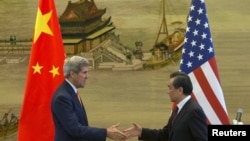Despite growing tensions over a territorial dispute in the South China Sea, Chinese President Xi Jinping says relations with the United States remain stable.
Xi told visiting U.S. Secretary of State John Kerry on Sunday that he looks forward to his upcoming visit to the U.S. in September and he believes that, working together, the two sides can bring Chinese-U.S. relations to a new height.
Kerry tweeted after the meeting that the two discussed "key bilateral issues" and Mr. Xi's "upcoming trip to the U.S."
The subdued remarks follow warnings Saturday from Chinese Foreign Minister Wang Yi that Beijing maintains "unshakable" determination to defend its sovereignty and territorial integrity.
Wang's warning, at a Beijing news conference with Kerry, came as international tensions have been rising over disputed claims in the mineral and energy-rich South China Sea. China has laid claim to wide swaths of the region — particularly near the Spratly Islands — despite internationally recognized claims from the Philippines, Vietnam, Malaysia, Brunei and Taiwan.
China has been building reefs and outcroppings at seven maritime sites in a push to strengthen its claims.
The Philippines has called for "urgent action," while the Association of Southeast Asian Nations recently warned that Chinese encroachment was a threat to regional peace.
Speaking alongside Kerry, Wang said China was prepared to talk. But he also said Beijing would not back down on South China Sea construction, which he said "is something that falls fully within the scope of China's sovereignty.''
U.S. officials said this past week that the Defense Department was considering sending military ships and planes to the South China Sea to enforce freedom of navigation. Beijing countered, saying that any such move would be considered provocative.
Neither Kerry nor Wang responded to a question about the U.S. consideration of air and sea patrols.
Wang said that while “China and the United States do have differences on the South China Sea issue, the two also have a lot of agreement.” He added that “both hope to maintain peace and stability in the South China Sea and are committed to freedom of navigation enshrined in international law.”
Wang also said Washington and Beijing must work together to speed up progress on a bilateral investment treaty. He urged Washington to loosen restrictions on high-tech exports.
Kerry later tweeted that talks on areas of U.S.-China cooperation were "productive."
The two diplomats also stressed their hope for the successful conclusion of the Iran nuclear talks. Kerry said it is possible that those talks could have an impact on North Korea and help push it in the same direction.
“But whether or not the DPRK [North Korea] is capable of internalizing that message or not, that’s still to be proven,” he said.
With his two-day visit to Beijing complete, Kerry will now travel to South Korea for talks with President Park Geun-hye and other officials on bilateral and regional issues before returning home.





